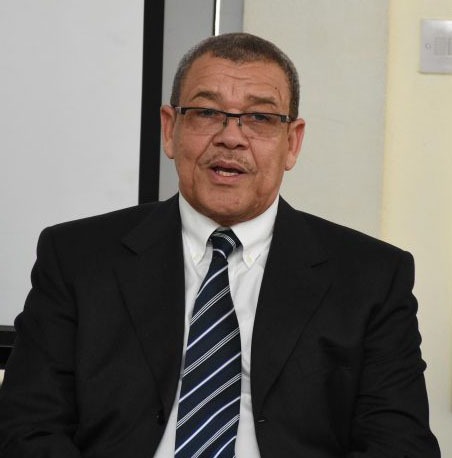The Guyana Revenue Authority (GRA) is accusing local fuel importers of abusing excise tax exemptions to skirt tax obligations.
In a letter to Minister with responsibility for Finance Ashni Singh, dated March 2nd and seen by Sunday Stabroek, Commissioner General Godfrey Statia explained that it was discovered that Rubis, GuyOil and SOL Guyana were misusing the Permits for Immediate Delivery (PID) system by comingling exempted fuel with fuel not exempted or partially exempted so as to avoid paying taxes owed on the required basis.
“Evidence so far reveals that as early as 2015, the system was being abused by SOL Inc, whereby exemption letters [from Exxon] were utilised to clear fuel while the full quantity was not delivered to Exxon,” Statia alleged in the letter, which was copied to President Irfaan Ali, Vice President Bharrat Jagdeo and the Attorney General Anil Nandlall.
SOL Guyana was identified by Commissioner General Godfrey Statia as engaging in the practice to a “major extent”.
Sunday Stabroek reached out to Earl Carribon, General Manager of Sol Guyana for a response to the claim, and was told that the company has no comment at this time. “We will release a statement in due course,” he said.
Nandlall, when contacted, said that he had been informed that a letter on the issue was being dispatched to his office but he had not yet seen it. “I’ve been busy in Parliament this week and [Friday] was spent preparing submission for the Elections Petition case so I have not yet read any correspondence on this matter,” he explained.
The letter explains that it was the practice of the Revenue Authority for several years to allow the major oil companies (mainly SOL, Rubis and GUYOIL) to import and enter tax exempted fuel for various businesses who benefitted from partial or full exemptions on fuel.
“On so doing, the oil companies are required and expected to, inter alia, deliver the full exempted quantities imported and entered to all such beneficiaries, which the beneficiaries are expected to utilise for the intended purposes,” it further notes.
However, a 2017 investigation and reconciliation by the Law Enforcement and Investigation Division (LEID) of GRA found that the PID system was being misused as oil importers were utilising exemption letters to clear PIDs without regard to whom the fuel was destined for, i.e., whether the fuel was fully exempted, partially exempted, or subjected to the tax.
An explanation that the fuel was held in “virtual tanks” for delivery to the beneficiaries showed that there was commingling and the oil importers were abusing the system since not all exempted fuel cleared by the importer was being cleared by the beneficiary, thus allowing the oil importer to benefit from increased cash flow by not paying the government on the required basis.
Both LEID and the Customs, Excise and Trade Operations conducted a reconciliation which indicated that while all three major oil importers were allegedly involved, SOL was allegedly engaged in the practice to a major extent.
It was found that oil importers had imported and entered the fuel at duty free rate using the beneficiaries’ tax exemption letters, but failed to deliver the full quantities to the beneficiaries.
Letters held by the Guyana Gold and Diamond Miners Association were used to avoid payment of $482 million in taxes, Bosai’s letters were used for $606 million in un-acquitted exemptions, $53 million for Aurora Gold Mines and $61 million for Rusal.
Further in late 2020/early 2021 letters from ExxonMobil were used for exemptions which according to initial assessment could equal $2.6 billion in taxes. It is explained that with the exception of the sum assessed to Exxon, all amounts have been paid.
It appears that the letter was initially composed as an explanation for why new requirements for the PID system should be imposed on oil importers and customs officers.
Statia notes that following the discoveries GRA suggested that with each payment and the clearing of each PID, a computation must be attached showing Imports, Exemptions vs Acquittals for each import, with the importer submitting a monthly schedule detailing similar information, but advising on who are the beneficiaries.
“Law Enforcement will thereafter utilise the monthly submissions and reconcile same with the beneficiaries, thereby allowing for timely and easier reconciliation and payment and also minimizing the use by the importers of the government’s funds for their own cash flow,” he added, while noting that GRA would then utilise Acquittals during the previous year (2020) as a guide to the exemptions to be granted in (2021), thereby minimising the exemptions vs Acquittals effect.
A concurrent investigation would examine documentation as far back as 2015 and all arrears payment(s) effected, by reconciling all fuel (PID’s) cleared using exemption letters versus those acquitted by each exempted or partially exempt beneficiary, while at the same time verifying that these letters were not utilised by more than one oil importer, or that there was no collusion with the beneficiary.
Pushback from the oil importers and some custom’s officers led to a piecemeal implementation of the proposed fix and the eventual return to the old system, he states before recommending that the new method should be imposed.
As a result, Statia has suggested that the Attorney General be approached on the way forward.





